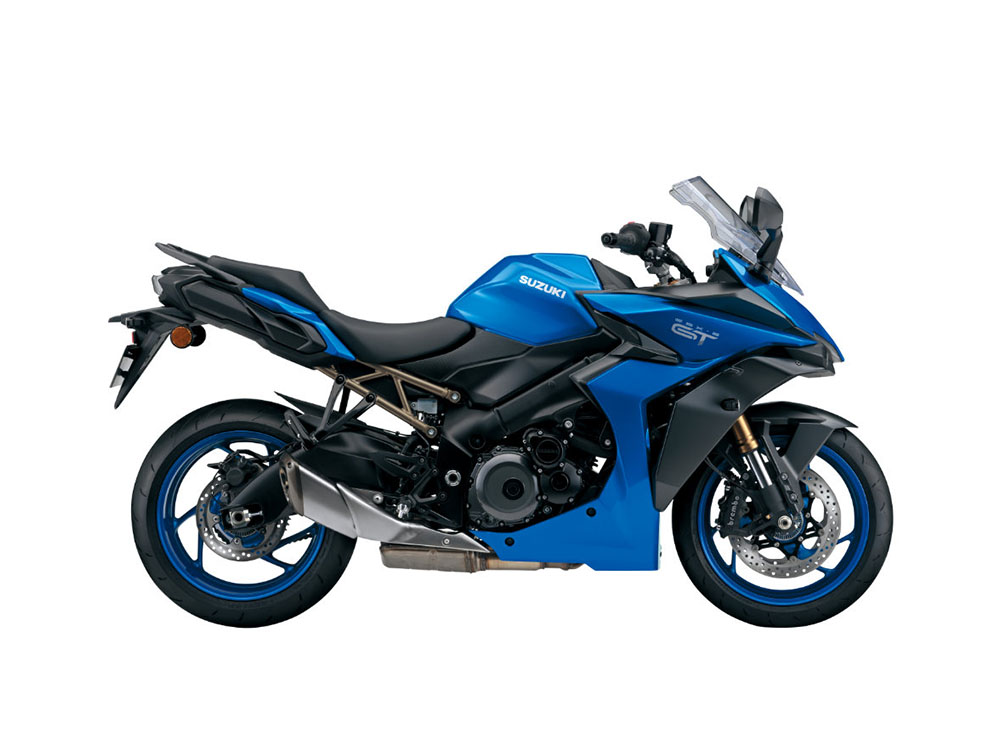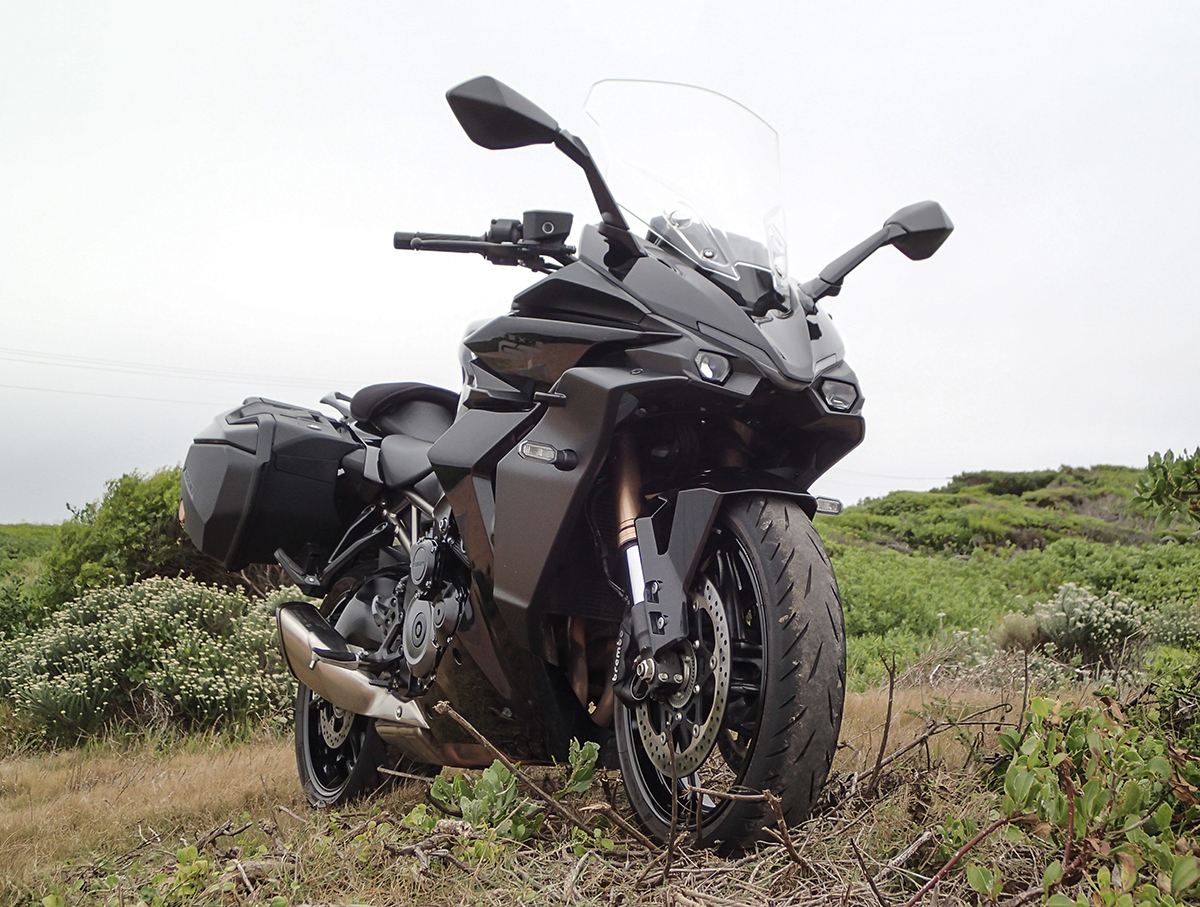
In recent years Adventure motorcycles have become such competent all-rounders that they have overshadowed traditional Sports Tourers. They also come with a variety of luggage options, decent wind protection and good passenger accommodation, all features that score points for touring motorcycles. But here is the thing… not all of us are Dakar wannabees.
If you cut your teeth on a sports bike rather than a dirt bike, then sleek and fast is what gets your pulse racing. The relatively spindly and ungainly look of long travel suspension Adventure bikes just does not float your boat. This plays out in the riding experience too. Dirt-oriented wheel sizes can feel vague in comparison to sport bike wheels. A sporting chassis just feels sharper on tar roads. Period. Enter Suzuki’s GSX-S 1000 GT. A thoroughly modern Sports Tourer.
Irene and I were planning to ride down to PE to spectate at the Ironman triathlon. While I was busy with our bike build-off competition with Dirt & Trail, I could not fail to notice the sleek and purposeful Glass Sparkle Black GSX-S 1000 GT parked off to one side. On the spur of the moment, I asked Suzuki’s Chris Kuun if I could put it to a “proper” touring test, sharing my plans for my PE ride.
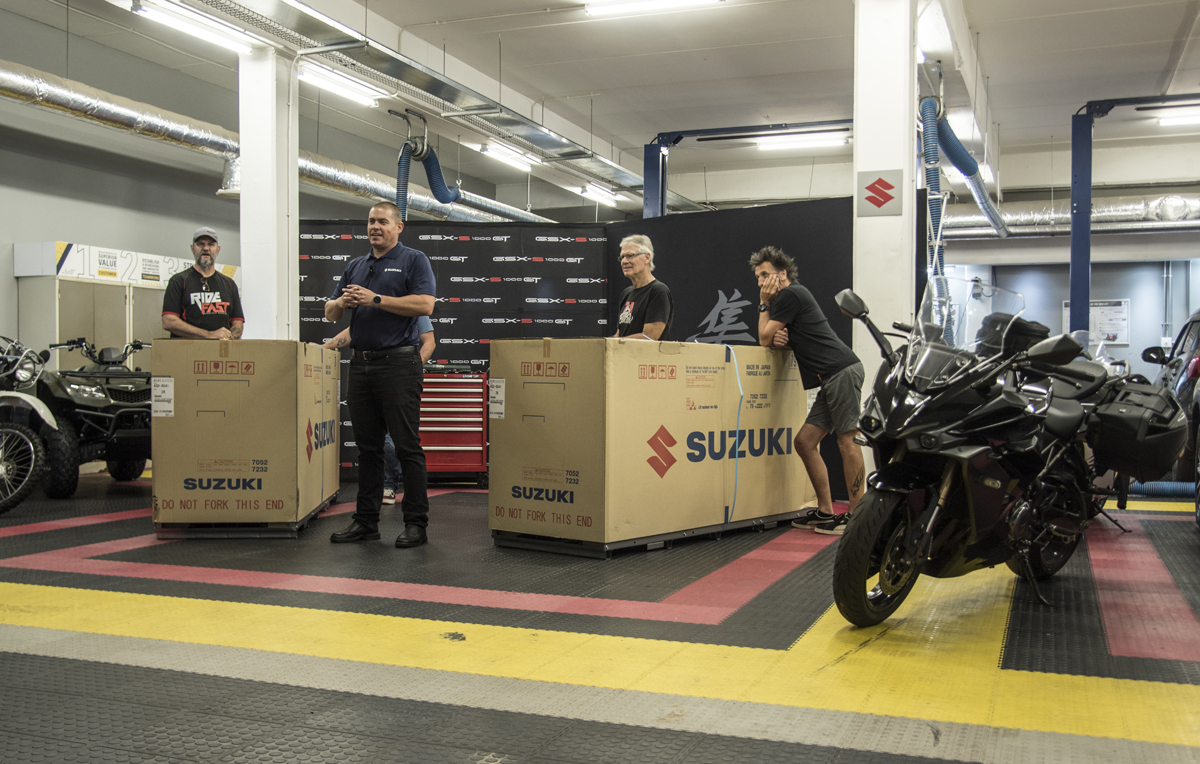
Typical of Suzuki’s management, Chris’s answer was immediately in the affirmative. Suzuki, in their international marketing statement for the bike, has this to say: “Suzuki is thrilled to unveil a high-performance motorcycle with a soul of a champion that delivers features and technologies enhancing any long-distance sport tour”. “A high performance, yet comfortable Grand Touring motorcycle”. Valid claims? We would find out in due course.
So let’s have a look at what the GSX-S 1000 GT is exactly. Firstly, it looks thoroughly modern, with unmistakable sporting origins. The riding position has been relaxed to make for long-distance comfort and general ease of use. At the heart of the beast is a K5 GSX-R motor. Hailed as one of the best, most robust and most reliable sporting four-cylinder engines to ever come out of Japan, the 999cc liquid-cooled, 4-valve DOHC motor has been mildly reworked with revised camshafts and other minor tweaks to make it suitable for its GT application. It pumps out a healthy 152 PS (110 Kw) and 105 Nm of torque, 70% of which is available from 3000 rpm.
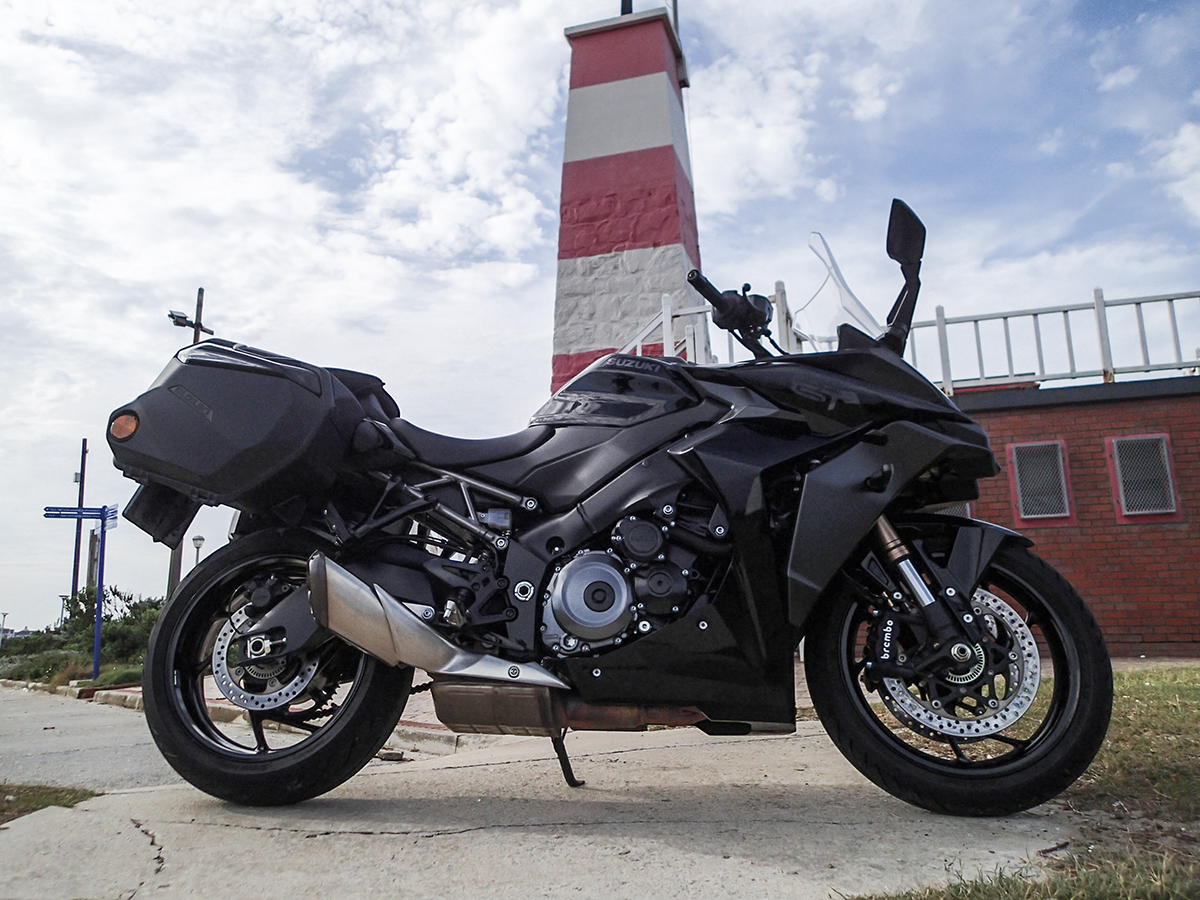
It is also sweet and smooth throughout the rev range, encouraging the rider to really use the power on tap. Especially when mated to a typically slick, quick-shifter equipped 6-speed box. More on that later. There are three riding modes with varying degrees of throttle response. ‘A’ is just crazily abrupt, ‘C’ is lethargic but ‘B’ is baby bear’s porridge – just right! 5 stage traction control is there to save your ass if you are ham-fisted or simply hit a small patch of slippery stuff.
A tank capacity of 19 litres makes for a decent range between fill-ups. The suspension is by Kayaba, with 120 mm of fully adjustable travel from the upside-down front forks, complemented by 130 mm of shock travel from the preload and rebound adjustable rear damper. The spring rates are spot on, giving a firm but supple ride which coped well with the road surfaces encountered on our trip. Braking is another strong feature of the GT. The twin 310 mm front discs and Brembo monobloc 4-pot callipers provide good power and feel, assisted by a 240 mm rear disc with Nissin 2-pot calliper.
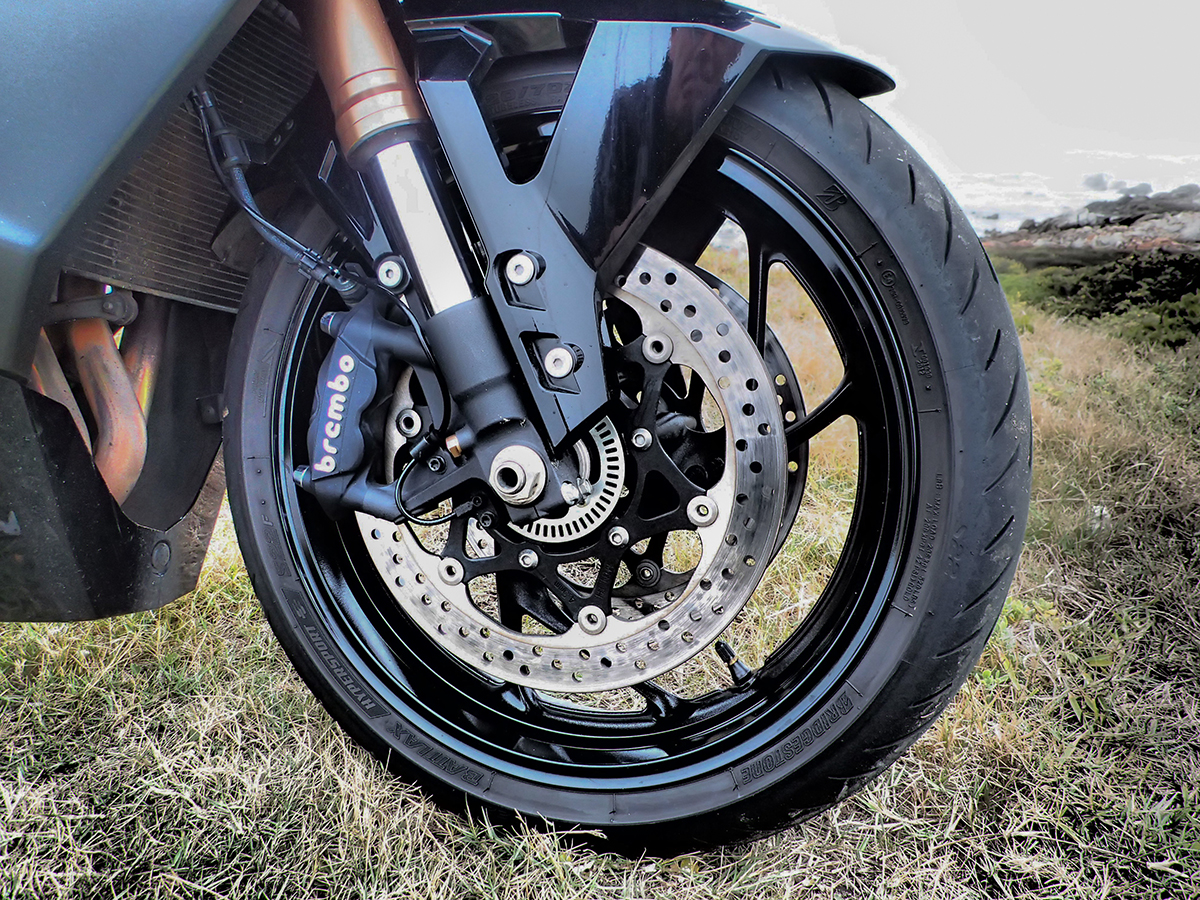
The frame is a typical Suzuki alloy twin spar. The end result of all this chassis work is a bike that is relaxed and easy to ride yet superbly stable at all speeds over all the road conditions that you are likely to encounter when tar road touring. Even violent direction changes to dodge a pothole do nothing to upset the splendid stability of what is a tried and tested chassis.
The dash display is, as one would expect in this day and age, a TFT which provides easy access to all the information that a touring rider would require, and then some. Suzuki’s mySPIN connectivity app integrates with your Smartphone for those who have that bent. I personally enjoy the solitude of undisturbed helmet time when I ride long distances, so I did not put this feature to the test.
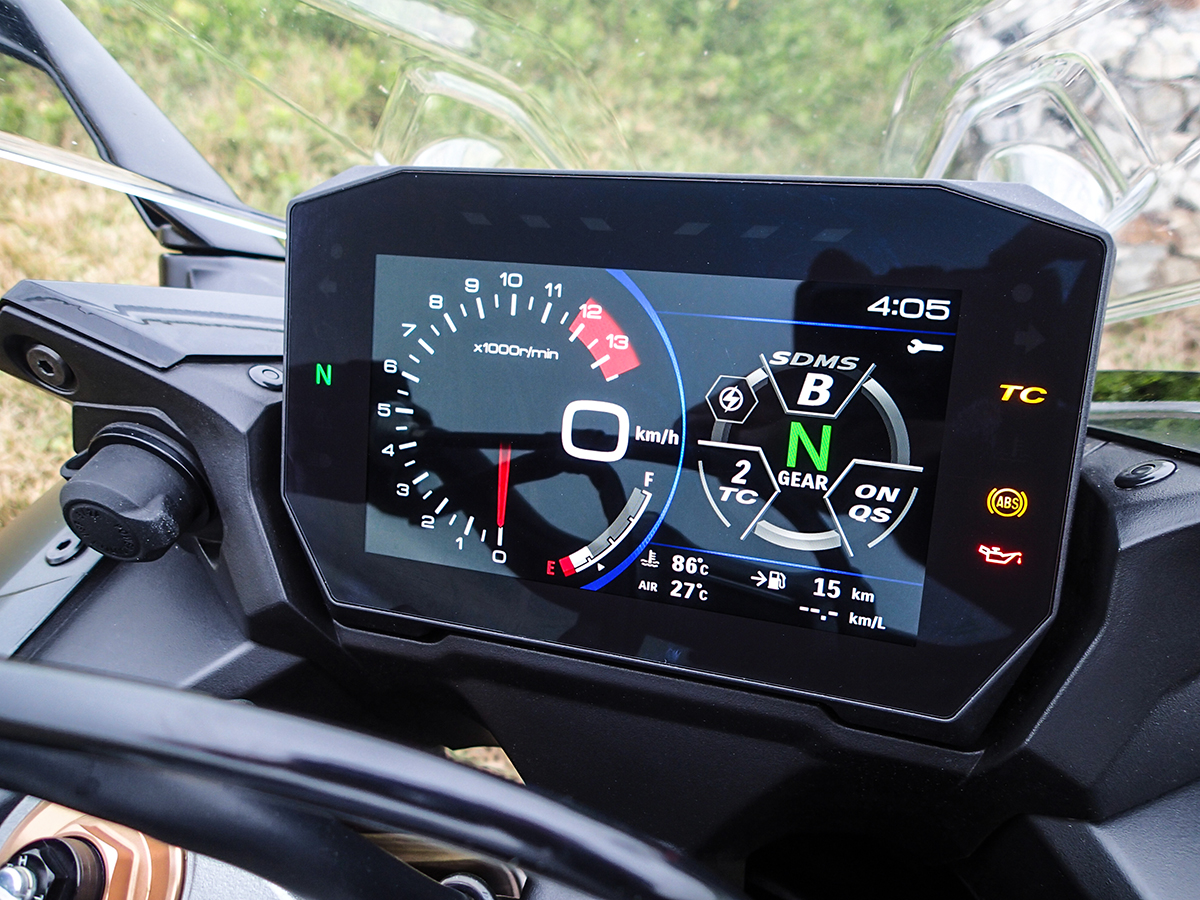
A brilliantly effective cruise control takes the pain out of long-distance open-road riding. Roll up behind slower traffic, gently use one finger on the front brake to disengage the cruise control, overtake then hit the resume toggle. The resume can be a trifle lethargic, but I prefer that to a violent throttle-on which can be a little unnerving from a powerful litre bike. It is seldom necessary to drop a gear, as the decent torque lets the GT punt past all traffic without breaking a sweat.
When touring two-up on a bike various aspects come into play that would not be an issue when one-up. Take packing space for one. Strapping a stuff bag on the back seat pretty much sorts you out one up. This is not an option when two up, especially when the passenger is of the fairer sex, as you have to cater to wants, not just needs. Irene always says I just need spare jocks and socks and I’m sorted. With her, not so much. Different shoes and clothes for different occasions, some ‘in case’ clothes, and then let us not forget the ‘body putty’. Panniers, be they soft or hard, become essential, with a top box making it even easier.
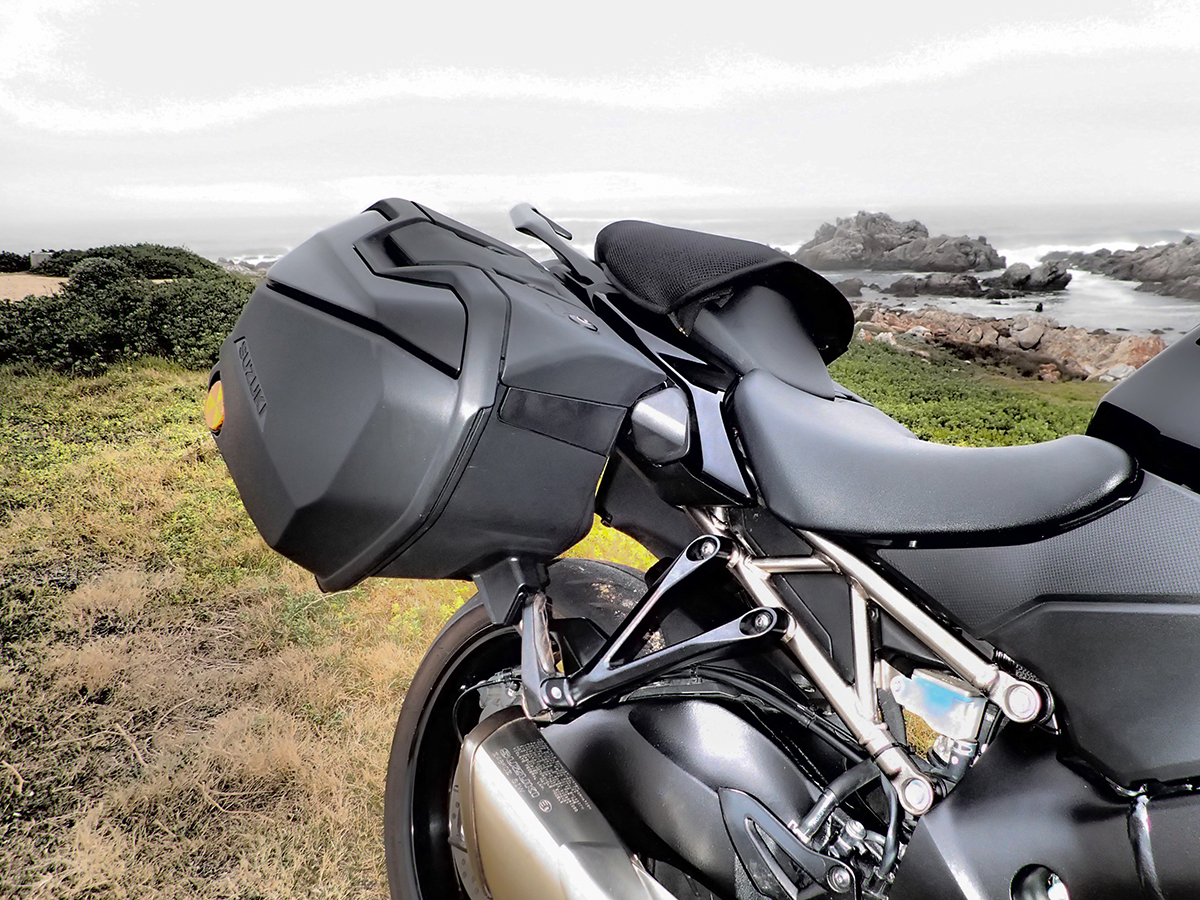
Suzuki gives you the option with the GT of factory panniers of around 28 litres each. Their shape is such that they pack well and we managed fine for the stuff we needed for a 6-day trip. The bike is designed to accept hard luggage without having to fit full frames. This makes the bike look sleeker when the panniers are off, however, I found the fitting and locking system just a little ponderous as compared to what I have become accustomed to with Givi luggage.
The same can be said for the Suzuki tank lock tank bag with which the bike was also equipped. A tank bag is a marvellous thing on a touring bike, giving you easy access to stuff like wallets and cameras and a visor cleaning kit. The locking system on the Suzuki factory bag was a little hit-and-miss. It doesn’t engage with the reassuring click of a similar Givi system, which is so good it really is a one-handed operation to pop the bag on. To access the tank cap you need to take the bag off and on. At times it went on sweetly, but at others, I wrestled with it a bit. There is definitely a difference between the occasional user versus someone who uses it daily. The more you use it the easier it becomes for sure. Once in place, the factory luggage sits perfectly and does the job well.
Ok, so how was the ride? Well, let me just say, we were planning on putting the GT through the comfort wringer on the trip down to PE. My wife Irene is no newbie when it comes to long pillion rides. Just recently we did a 1360 km day ride from Pretoria to George in the Western Cape and she was still properly chirpy when she hopped off the bike. I suggested that we would set off and see how we faired. If necessary we could overnight at Gariep, or maybe Cradock.
We got away at 5:30 AM on a Thursday and made good time to Kroonstad, our first fuel and breakfast stop. The bike was running sweetly in the crisp and cool morning air. I used the cruise control with good effect and found that we could cruise at 135 km/h, utilising less than 50% of the available revs. The motor is silky smooth and relaxed at this speed. Fuel consumption was settling at around 19 km/L. As we do when we have spent a couple of hours on a new bike, we have a bit of a de-brief, assessing the various aspects of the bike.
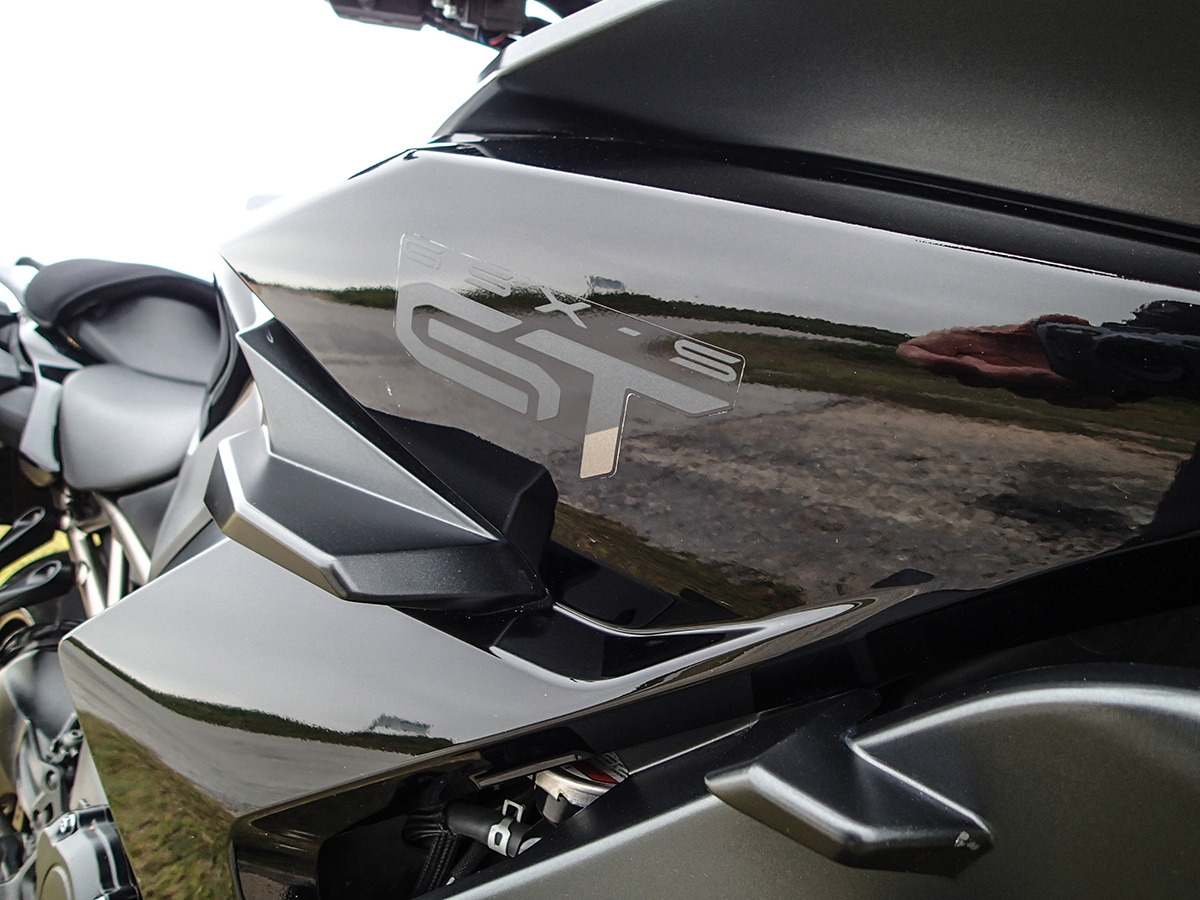
We agreed that the absence of vibes was great. What we were not so sure about was the aerodynamics. Let me explain. The bike was fitted with the optional taller touring screen which makes for effortless riding, negating wind blast on your body. The riding position for both rider and passenger is excellent. I am 6’2” and Irene is 5’ 7”. We both felt perfectly comfortable ergonomically. Irene missed the security of a top box as she is well known for shooting some ZZZ’s on long boring sections of the road. Easily remedied.
What was more apparent was helmet buffeting. Wind passing my helmet was tugging her head around and that was causing my helmet to be tugged around too. This effect is exacerbated by the prevailing wind direction. I suspect that it could be negated by using a wind deflector on the taller screen. Riding the bike at speed one-up is not an issue at all.
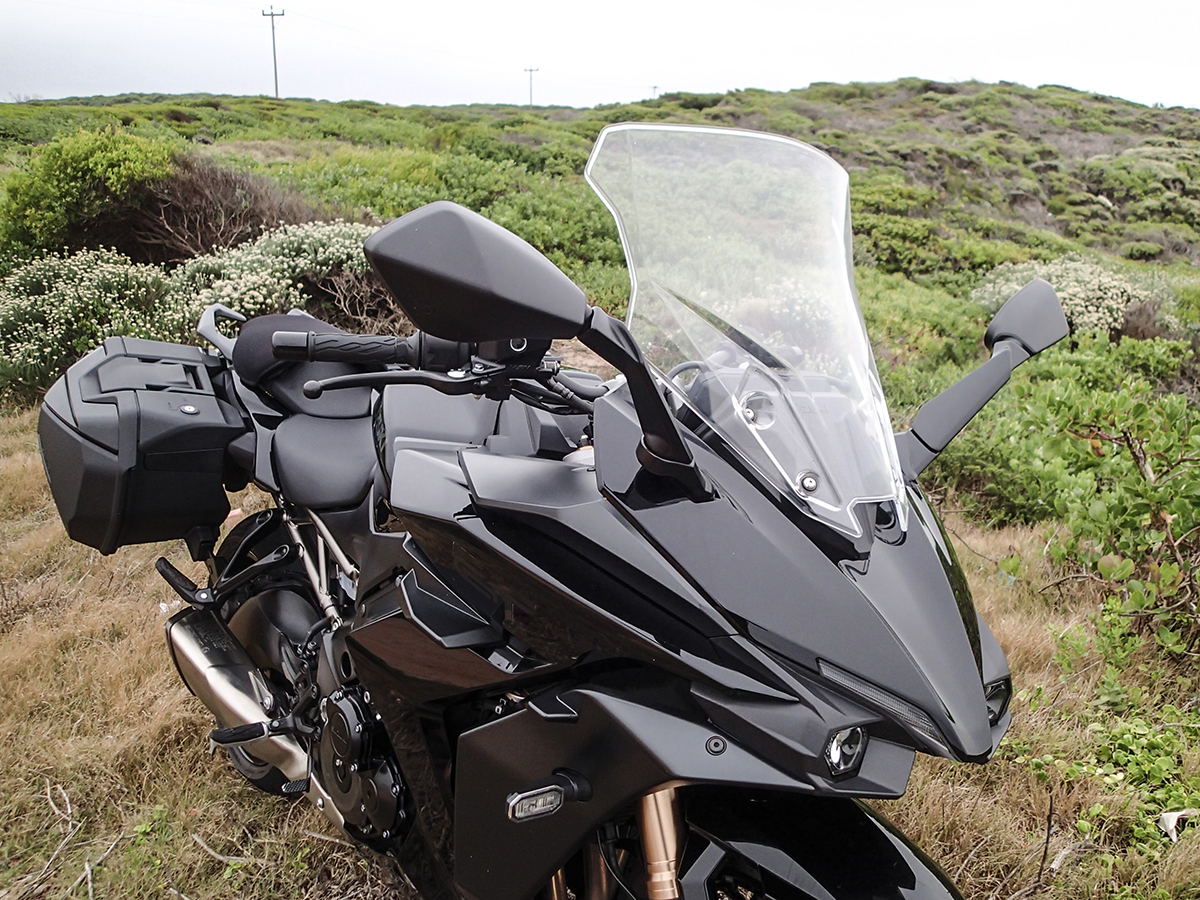
We suspected that the gel seat that I fitted to her seat also had an effect. The passenger seat is significantly higher than that of the rider and puts the passenger’s helmet in the ‘dirty air’ from the rider. We whipped it off for the next leg of the journey to see if the now slightly lower passenger seat would negate the dreaded head wobble, but to no avail. Irene, as did I, found the seat foam unnecessarily firm. One other omission is a main stand. When you need to do chain maintenance the lack of a main stand is a pain. Period.
Speaking passenger seat, it is not only significantly taller, but it also narrows to the top, giving the passenger very little leeway to move around to any great degree. The rider has a far wider and larger perch, enabling some movement, however, the passenger seat also slopes forward which shifts the passenger onto the rider, somewhat negating their ability to move too. A flatter more level seat and the more yielding seat would be a massive comfort enhancement for really long days in the saddle.
Don’t get me wrong, sport bike riders will think the GT is seat comfort heaven, but then again they seldom demand 1000 km plus days from their bikes. Tail comfort is also directly proportional to the ambient temperature as well as the road that you are traversing. Droning along in 34°C heat down an arrow straight Karoo road puts way more stress on your butt than strafing through sweeps over a mountain pass. You have nothing to divert your attention from the discomfort that you are experiencing.
Bloemfontein and Colesburg came and went. Coffee in Bloem and ice-cream cones in Colesburg allowed some recuperation for tired tushes. It is then a more entertaining 200-odd kay squirt to Cradock for a final refuel. Cradock was properly hot. Getting off the bike while we refuelled, Irene looked at the GT and declared “Suzuki 1, Irene 0!, I’m not sure I can go any further”. The next 250 k’s are way more entertaining and I knew that if we got going she would manage. I did a bit of a sales job along those lines on her and she reluctantly said “Let’s do it then!”. I suggested an old trick I’ve employed in some endurance events I’ve tackled like the Comrades and endurance cycling events, where the pain is part of the deal. Irene drank a bottle of water and washed down a Grandpa powder. Then we were back on the bike.
My daughter lives in PE and had made a booking at an Italian restaurant for that evening at 6:30. We rolled out of Cradock at 4:05 PM with 255 kays to do. This is the best part of the trip. The road undulates and sweeps through the countryside then traverses a mountain pass before dropping down to the coastal plain and onto PE. This is where the GT shines and clearly shows its reason for being.
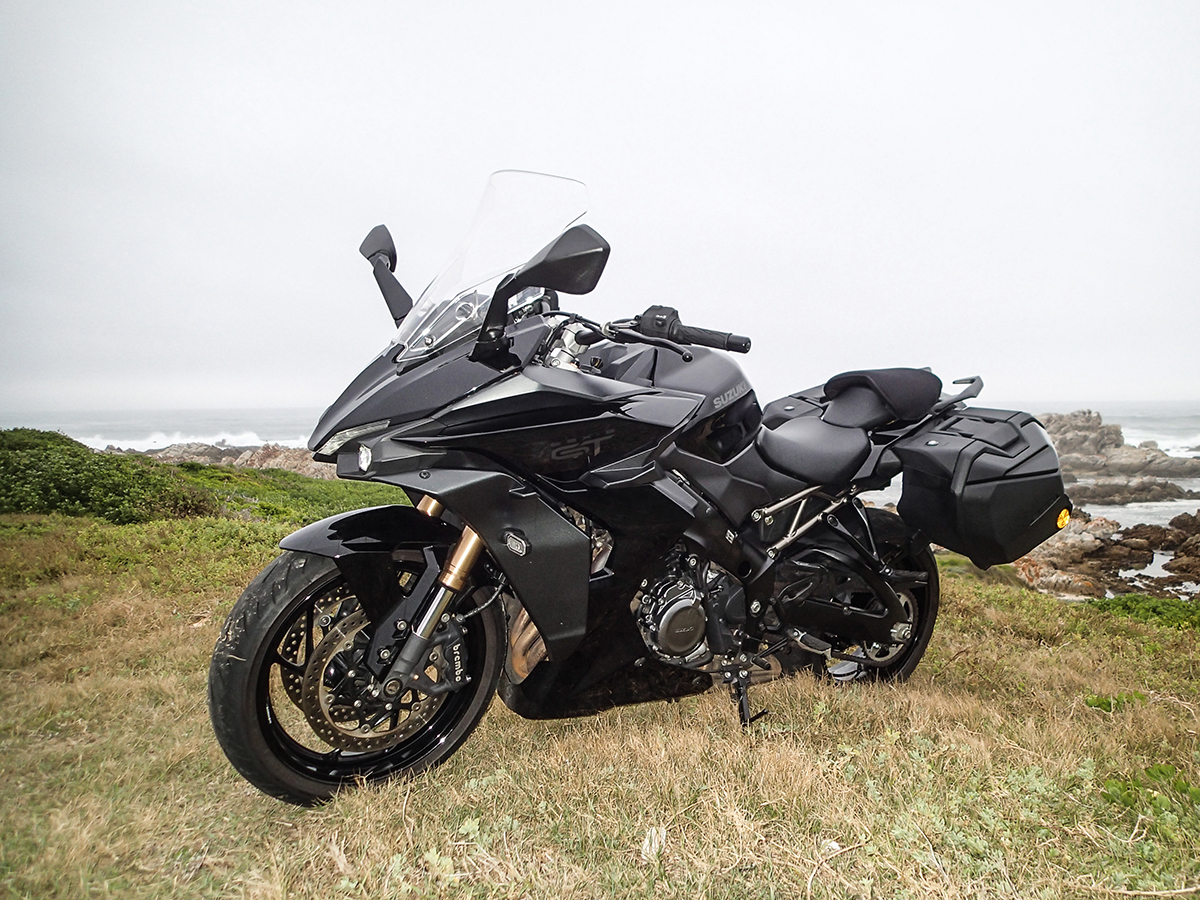
Catching a hurry-up I started exploring the later part of the rev range more often. Pitching the big Suz on its side and getting on the gas, reeling in the next straight and then playing ‘repeat’ through the next sweep or bend. The GT’s GSX-R credentials shine through in this sort of riding. Stable and accurate steering, it rails through the mountains effortlessly. Any butt pain was forgiven and forgotten as we enjoyed the sporting prowess of the bike. We rolled into the drive of my daughter’s house in Summerstrand at 6:15 on the dot. What an awesome ride! Got to say that the first ice-cold frosty enjoyed with dinner went down singing hymns!
PE is a great place to be over an Ironman weekend, with healthy, positive athletes everywhere. Despite some rain on the day, conditions were great for the event and it made for quite a spectacle. Visiting with family is also always special, so it was with happy hearts that we hopped on the GT for the journey home 4 days later. With the wisdom of hindsight, we bit off a more palatable first-day ride, overnighting at a B&B in Gariep.
The psychology of knowing that you don’t have to go all the way home in one go eases discomfort and we really enjoyed the day’s ride. We caught an afternoon nap before enjoying dinner on the deck of a cool little local restaurant called Tjaila Tyd. The next morning we got going early, getting to Bloem for coffee by 7:00 AM. Riding out of Bloem we saw some serious cloud formations rolling in and it was inevitable that we would get to asses the weather protection on the GT for the first time on our trip. And so it was!
Just past the Verkeerdevlei toll plaza, the heavens opened up properly! Realizing that the storm was localised, I jumped on the main jet and once again realised the GT’s reason for being. Spin that fantastic motor up past seven grand and it gets a real hurry up. At 180 km/h two little green flashes start flashing on the TFT display as if you need reminding that you are hauling! In no time we dispensed with the rain and motored through to Kroonstad for breakfast.
Similarly, the last 240 k’s to Pretoria were over in no time. The GT deals with slower traffic with disdain. What our return journey showed was the intended purpose of this machine. This is a ‘Sports Tourer’ in every sense. Much more comfortable than the typical sports bike, but less so than a dedicated tourer. You really cannot have it all. It is 500 km comfortable, not 1130 k’s… There is always an area of compromise.
Checking the numbers ‘post trip’ showed 2395 kilometres covered over three days at an average of 17,5 km/L per litre. Not bad fuel economy for a sports tourer “two-up” in my opinion.
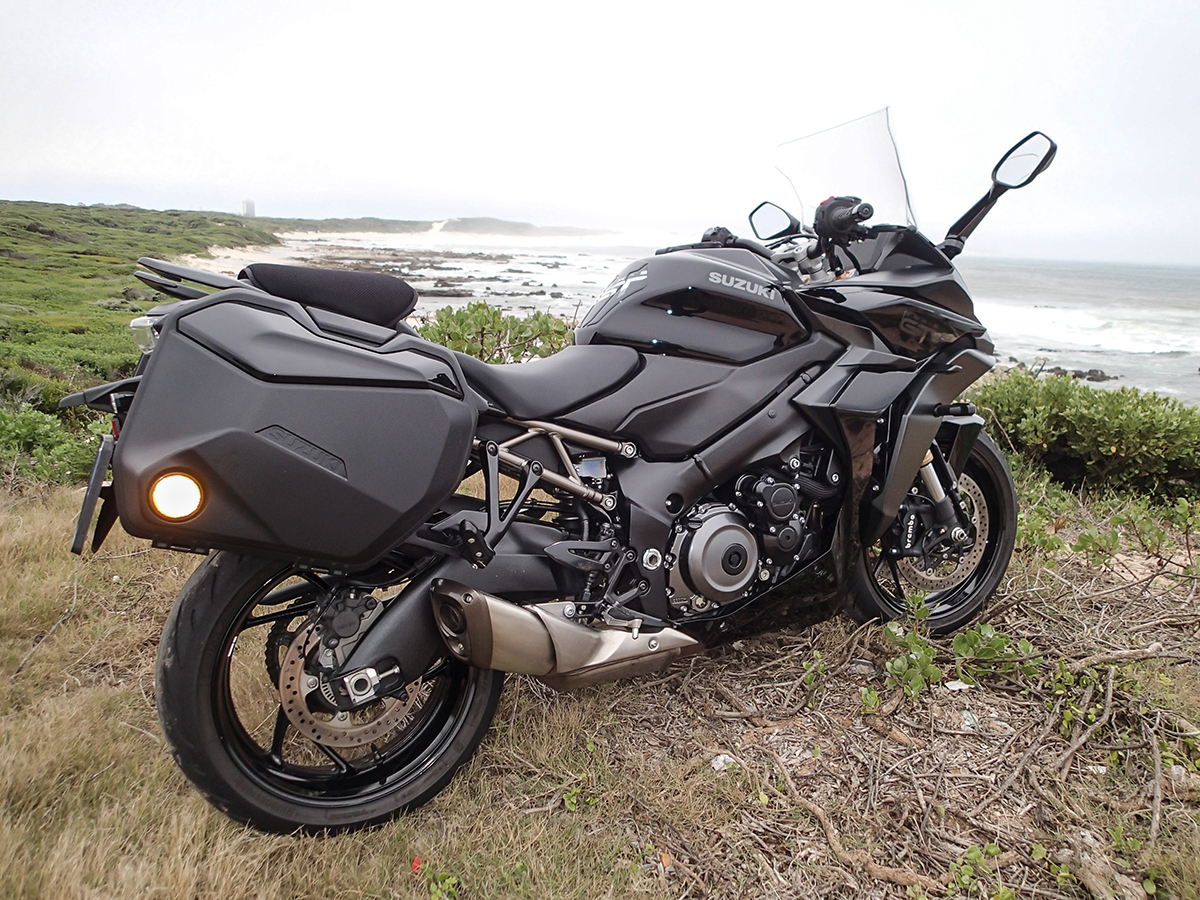
If you place a higher value on all-day comfort than on the sporting nature of a bike, then the 1050 V-Strom may be a better fit for you. If, on the other hand, you want sporting prowess, and unlike me, you don’t plan to ride 1130 k’s in a day, then Suzuki has built just the bike for you. It’s called the GSX-S 1000 GT.
Suzuki GSX-S 1000 GT
For more information on the bike featured in this article, click on the links below…




